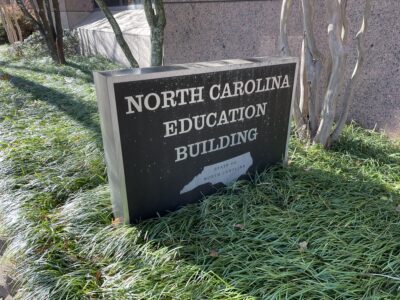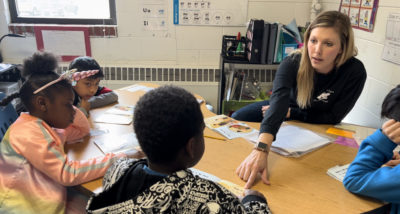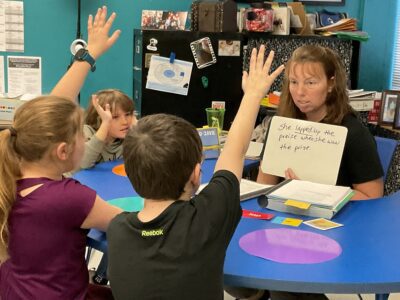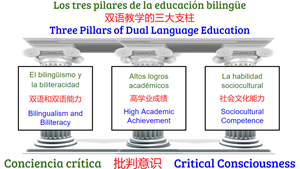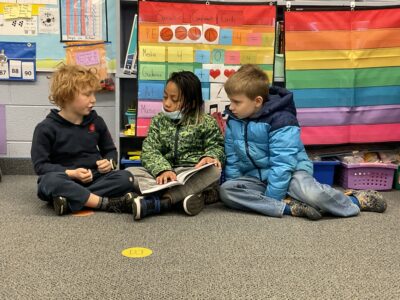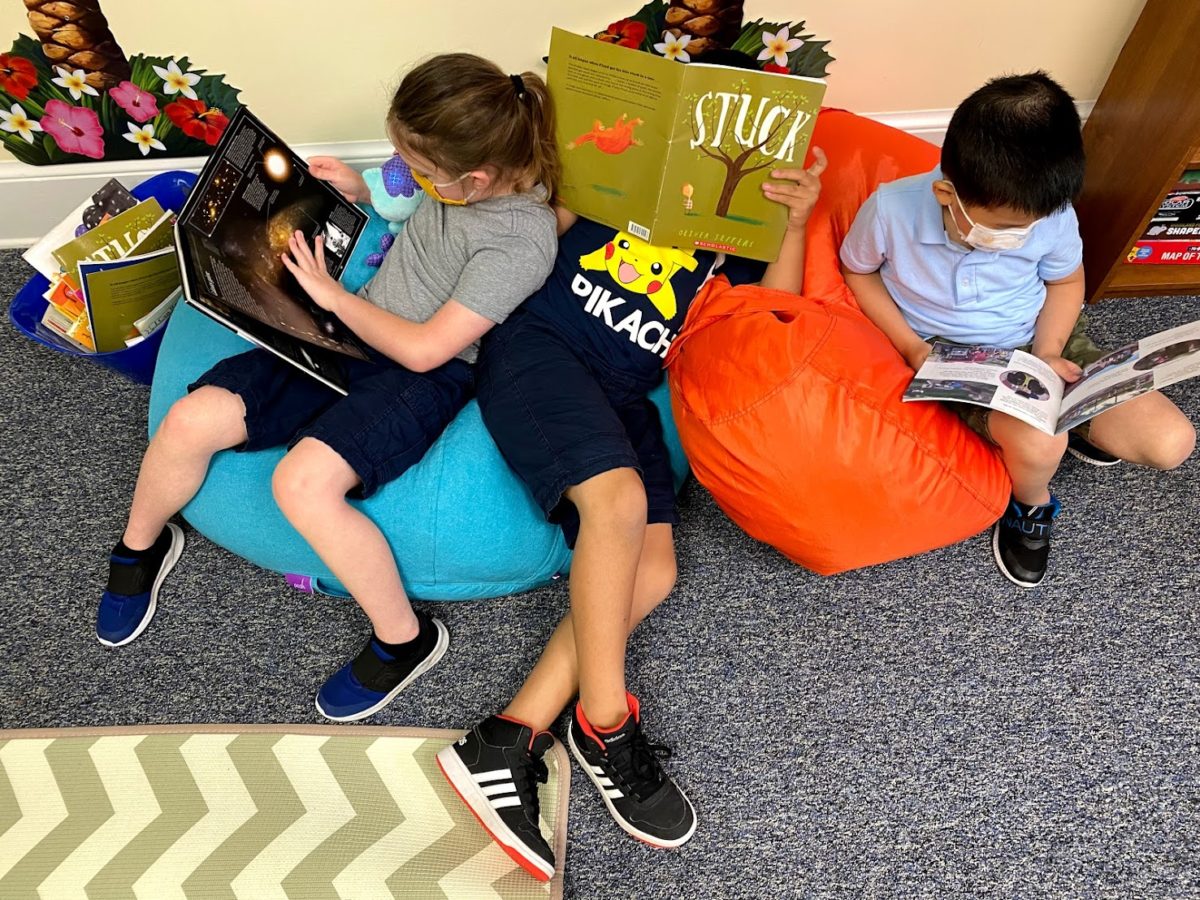

|
|
National education nonprofit Bellwether hosted a webinar last week looking at the past, present, and future of the science of reading, including a spotlight on Charlotte-Mecklenburg Schools’ literacy efforts.
Since 2013, 47 states and the District of Columbia have passed laws or policies to encourage “science of reading-aligned practices,” according to the webinar. While there is evidence of momentum for the science of reading across the country — including in North Carolina — Bellwether found challenges have also emerged.
With more than 30 states currently implementing such policies, those challenges include decentralized systems, capacity (human, technical, and financial), unclear or unrealistic expectations, and sometimes difficult-to-navigate political landscapes.
“We’ve seen this movie before with other large-scale reform efforts, and it doesn’t always end well. Sometimes promising ideas don’t reach their full potential or get rolled back,” said Andy Rotherham, Bellwether co-founder and partner, who moderated the webinar. “The big lesson that comes out is about implementation.”
The webinar follows Bellwether’s release of a new report last month on the science of reading, “On the Same Page: A Primer on the Science of Reading and Its Future for Policymakers, School Leaders, and Advocates.”
Among other things, that report highlights that trends in teaching reading have diverged for decades. Advocates for the science of reading are working to convince education stakeholders that this approach leads to better reading outcomes, the report says, while also fighting implementation and politicization hurdles.
The Science of Reading is not a curriculum; nor is it simply an emphasis on phonics. It is a body of research from the cognitive, communication, developmental, psychological, and neurological sciences about how children learn to read and translate reading skills into other domains. Advocates for aligned instructional methods want to see a comprehensive regrounding in foundational skills continuously integrated with knowledge building across content areas.
Excerpt from Bellwether’s report, “On the Same Page: A Primer on the Science of Reading and Its Future for Policymakers, School Leaders, and Advocates.”
“Those who share the Science of Reading ideology may have very different interpretations of the research and opinions on the knowledge they want shared,” the report says. “To turn promising results into better reading outcomes that last, advocates and policymakers should closely monitor implementation and learn from past education policy reforms.”
The report focuses on a few areas of implementation at the state level:
- Teacher preparation and licensure. Some teachers may oppose curriculum changes, the report found, due to preferring other practices or due to the amount of time and new materials required for science of reading training.
- Assessment and accountability. Districts and schools must pursue evidence-based instructional practices, by prioritizing high standards, accountability during implementation, and assessment of instruction.
- Classroom practices and curriculum materials. Most states are reluctant to directly limit district control over curriculum, Bellwether found. North Carolina is one of three “low control” states, meaning state law offers guidance but does not generally restrict or require materials.
In 2021, N.C. lawmakers updated the Excellent Public Schools Act to emphasize the use of the science of reading to ensure students in elementary schools can read on grade level by grade three.
The 2022-23 school year was the first year of implementation of science in reading in N.C. classrooms. Officials from the Department of Public Instruction (DPI) previously said it is likely that the state will fully know results from these efforts when students now in kindergarten reach third grade.
Charlotte-Mecklenburg Schools (CMS) first debuted curriculum based on the science of reading — EL Education — back in August 2019. Former superintendent Clayton Wilcox led the search for a new curriculum after learning the district had 17 different reading initiatives when he started in 2017, per a WFAE report.
Last week, CMS Chief of Strategy and Innovation Beth Thompson joined the Bellwether webinar to speak about the district’s efforts.
“We saw results really quickly, especially with our younger students,” Thompson said. “We need for folks to be able create the conditions for commitment, not compliance, and to support districts in doing the right work that’s going to change the lives of students.”
Other panelists included:
- Barbara Davidson, president of StandardsWork and executive director of the Knowledge Matters Campaign.
- Penny Schwinn, former Tennessee Education Commissioner.
Here’s a look at some of the other main takeaways from Bellwether’s webinar and report.
Implementation and accountability
One of the first steps of implementation, Davidson said, is moving away from practices that don’t work, such as three-cuing. North Carolina’s newest state budget prohibits the practice, which teaches students to read based on meaning, structure and syntax, and visual cues.
Then, teachers must receive training on reading science and practices.
“A big part of the science of reading movement is this no-shame zone, for teachers to say they didn’t know it,” Davidson said.
Schwinn said it’s helpful if districts can offer “micro-lessons” throughout the year for teachers, in addition to one-time training.
As districts and schools provide training to teachers, Schwinn added that leaders cannot let poor implementation go unchecked.
Finally, providing high-quality training is crucial to success.
“Do not give teachers low-level products or profession development — they deserve better because they are professionals and should be treated as such,” Schwinn said. “And cheer and celebrate the heck out of it, because people deserve to know they’re doing a good job.”
In North Carolina, state lawmakers have allocated more than $114 million to train NC Pre-K instructors, elementary teachers, instructional coaches, and administrators in Language Essentials for Teachers of Reading and Spelling (LETRS).
LETRS isn’t a program or curriculum. It’s training that shows teachers what students need to learn in order to read and write – and it walks through a scope and sequence in which students should learn these things. It covers the primary domains of literacy acquisition – like oral language, phonemic awareness, vocabulary, writing, and spelling. And, yes, it talks about the importance of explicit phonics instruction.
Excerpt from an April 2023 article by EdNC on science of reading implementation
LETRS training covers 160 hours of study across eight units and takes two years to complete. When rollout started in 2021, there was some initial pushback from teachers. Not all districts have provided stipends for teachers who complete the training.
“I think the resistance was not because teachers didn’t appreciate it, or that teachers didn’t believe in what the science of reading is offering for us,” Lynn Plummer, director of elementary education in Stanly County Schools, previously told EdNC. “I think the resistance just comes from the time constraint and putting my whole heart into this job and working eight, 10, 12 hours a day, but then I’ve also got to find time outside of my school day to complete this additional training.”
Since then, many teachers have been encouraged by early results. And last June, 29 North Carolina school districts completed LETRS training.
However, district and leaders have told EdNC that the work will take time.
“Results from big education policy changes can take many years to work their way through the system,” the Bellwether report says. “Those results often are not apparent to the public in real time. This leaves reforms, even those being implemented well, vulnerable to criticism that they are not working and should be scrapped.”
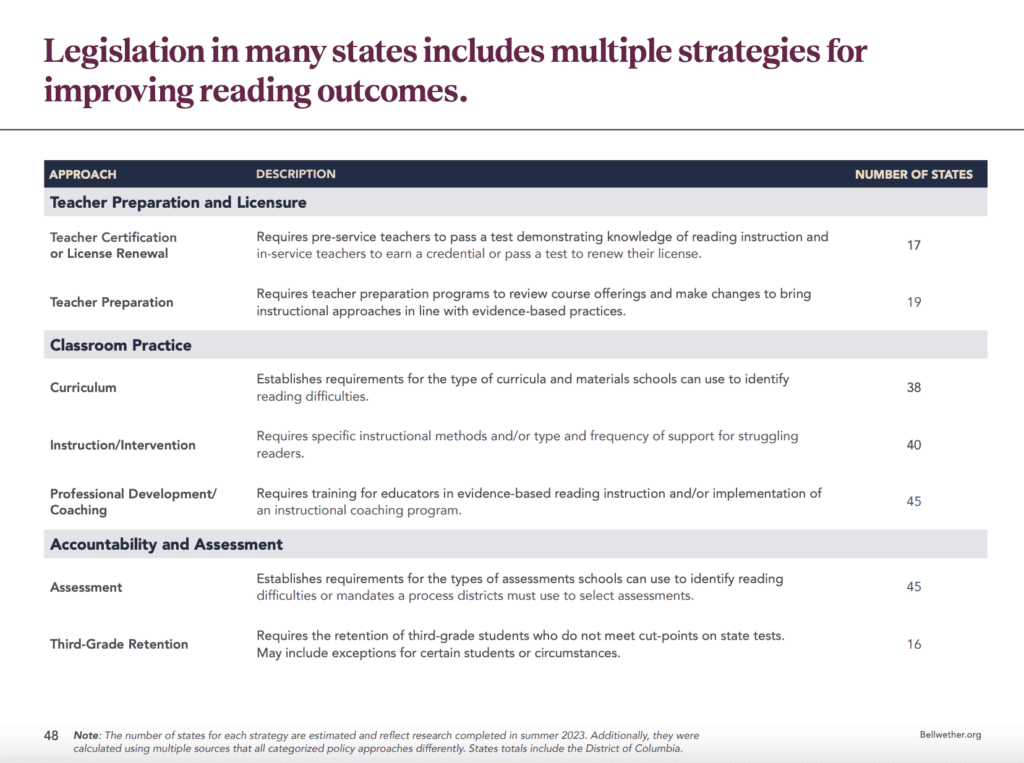

High quality curriculum
In addition to professional development for educators, webinar panelists also stressed the importance of providing high-quality curriculum in classrooms.
Providing quality curriculum helps both students and teachers, Davidson said. The curriculum helps ensure students are learning what they should, and it stops “expecting teachers to do the impossible.”
“Rather than expecting teachers to develop 180 days of lesson plans based upon this growing understanding of the science of reading, and their state standards, and many other things… teachers are now being supported by curriculum,” Davidson said. “A big part of why the science of reading movement will be successful, if indeed it is, is because there is curriculum now that is capitalizing on it.”
One challenge in finding strong curricula, according to the Bellwether report, is that there is no one standard dictating which resources are aligned with the science of reading.
At the end of the day, strong guidance is key, panelists said.
“Policy implementation requires substantial time, money, human capital (most importantly teachers), and technical support,” the Bellwether report says. “Poorly planned and under-resourced implementation efforts lead to a gap between policy goals and what happens on the ground, which ultimately limits success.”
In North Carolina, DPI does not set required materials for districts. However, DPI has created literacy instruction standards for pre-K through 12th grade to help with selecting curriculum.
In December 2022, districts were requires to “complete a form regarding the measures taken by each (district) to implement the requirements regarding the Literacy Instruction Standards (LIS) and literacy implementation plan,” according to DPI’s website.
That modified curriculum and instruction must be in place beginning with the 2024-2025 school year.
As of September, DPI had also hired 100 out of 115 literacy specialists to work with each district.
More on the science of reading
Teacher preparation
More than 19 states “are exerting pressure on teacher preparation programs to align with the Science of Reading,” according to Bellwether’s report.
“But the path to change is steep,” the report says. “Many pre-service teachers are not receiving high-quality, research-aligned training in reading instruction. Not only is training on key components often missing, but many programs also promote ineffective instructional
methods.”
In North Carolina, DPI can approve Educator Preparation Programs (EPP) that meet certain standards, including programs at public, private, and community colleges, among others.
CMS started its own teacher-prep program in 2019, marking the first school district in North Carolina to offer its own teacher residency after the General Assembly made changes to teacher preparation pathways in 2017.
The alternative licensure program requires a bachelor’s degree, minimum 2.7 GPA, and 24 hours of relevant coursework or passing test scores for all state-required exams for your licensure area. The program is at minimum 13 months and costs about $2,000.
Like all prospective CMS teachers, residents will need to apply for open teaching positions that fit their interests and qualifications, interview, and be selected by individual principals. Since the residency focuses on specific subject areas in high demand across the district, we expect the residents who successfully complete pre-service training to be strong candidates for many positions.
CMS Teaching Residency website
During Bellwether’s webinar, CMS’s Thompson said having its own EPP has helped the district better implement strong reading practices into its “teacher pathway.”
The UNC System is working to improve preparation for future reading teachers — looking to UNC Charlotte’s program as a model.
In 2018, the system published a report calling for better alignment between UNC System EPPs and school districts, increased field experience for teacher candidates, and more fidelity to evidence-based teaching practices.
“North Carolina must do better,” the report said. “We must educate more students to a higher level than ever before. That means recruiting and preparing more teachers who are equipped to succeed in today’s classrooms.”
Why does it matter?
“Reading is a life-transforming and essential skill. It does not come naturally; it must be taught. Nearly all children have the capability to learn to read, with the right teaching and support,” the Bellwether report says. “And yet, just 32% of fourth-grade students achieved reading proficiency in 2022.”
Literacy is crucial to academic and life outcomes, the report says, and early reading efforts are particularly important. Early reading skills can be a strong predictor of future academic success.
Reading proficiency rates are consistently low, the report says, and gaps have historically existed by race, ethnicity, and socioeconomic class. Those gaps were exacerbated during the pandemic.
Here are a few statistics highlighted in the report to showcase the importance of reading:
- Students who do not read proficiently by the third grade are four times more likely to drop out of high school than proficient readers.
- Among low-income students, the dropout rate is six times more likely.
- Among low-income Black and Latino students, the dropout rate is eight times
more likely.
In 2022, 32% of N.C. students performed at the “NAEP Proficient level,” according to the National Center for Education Statistics. That’s down from 36% in 2019 before the pandemic.
Since then, North Carolina has seen some gains in literacy, according to a recent DPI report.
A recent report found that the percentage of students whose scores show they were on track for their grade level at the beginning of the school year has increased in each grade every school year since 2021-22. For the 2023-24 school year, the percentage of students on track for the new school year was higher than the national average in each grade except kindergarten.
As science of reading implementation continues, the Bellwether report and webinar panelists emphasized remaining work related to literacy for older students and English Learners.
“Reading is a skill that must be taught…” the report says. “Students with strong reading skills by the end of the third grade (combined with other components of literacy, including oral language, vocabulary, and knowledge of the world) are more likely to exhibit stronger academic performance in other areas, such as math, science, and problem-solving, and are more likely to graduate high school on time.”
In North Carolina, Superintendent Catherine Truitt wrote in an EdNC perspective that while the work to implement science of reading continues, she is inspired by the progress made so far.
“The future is brightest for students in our state who are confident, capable readers,” she said. “Because of the hard work underway, and the systems and processes in place to sustain the momentum, I am positive that we will continue improving literacy outcomes for all students in our state.”
Check out the National Council on Teacher Quality’s recommended five policy actions to strengthen the implementation of science of reading, along with a report card for North Carolina.




